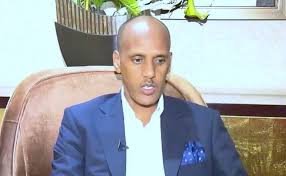By Mohamed Heebaan
Dear Prime Minster Ahmed,
I salute you for the courageous, earth-shattering reforms, the likes of which hasn’t been seen not just in Ethiopia, but to my knowledge, in the entire African continent. Our region, the Somali region, has been one of the biggest beneficiaries, because sacking Abdi Iley’s criminal administration ushered a new day for our people. Some people claimed that you invaded Jigjiga. You didn’t. You liberated it!

Abdi Iley wasn’t an ordinary tyrant. He was savage in the extreme. Not only he had innocent people tortured, raped and murdered, but he also had the dead and the corpses desecrated and stomped on! However, as gruesome as Abdi Iley’s administration had been, like all the butchers and barbaric regimes in history, there were people who benefited from his administration. So, if you see or hear about some people who protest on Abdi Iley’s behalf, don’t be surprised: they are the remnants who profited from our people’s misery. If you hear some people talk about Abdi Iley’s so-called accomplishments, they are doing that just to whitewash his crimes, in part, because they themselves were part of the rot!
There are people who say, “Abdi Iley’s rule is finished. Therefore, we shouldn’t waste any more time on it. Instead we need to move on and focus on dealing with the region’s present and future difficulties.” As Arabs say, that is a true statement with dishonest intent! We must ensure that Abdi Iley and his remnants are held accountable for their crimes, so that the punishment they receive will serve as a deterrence to the current leaders, and the future leaders would know abusing our people will cost them a heavy price.
A society with a short memory that doesn’t learn from calamities and doesn’t take precautions will end up falling into the same disasters over and over.
The Privatization Advisory Council:
Whoever put together the list of the Privatization Advisory Council is clearly stuck in the 19th century! To put together a 21-member national privatization Advisory council, in Ethiopia, a country where Muslims constitute the majority of the population, and not include even a single Muslim member on the list was truly scandalous! You cannot reform the country with old hands full of innate biases that see the Ethiopian people as the Privileged and the irrelevant, and who are prisoners of the 19th century mentality. In that 21- member advisory council, at least 11 members should have been Muslim economists and financial experts, unless someone can prove the impossible, and demonstrate that there are no Ethiopian Muslim experts in the fields of economics and finances.
Some people would argue that it is wrong to judge issues on religious basis because the moment you start traveling down that road, you start dividing people, instead of bringing them together. This argument is valid in secular democratic countries such as Sweden, Canada or Switzerland. But in Ethiopia it isn’t because in Ethiopia, things were always judged on biased religious basis. The bias to one religious group over the other was so overwhelming that it shaped the people’s thinking to the point that, today, in 2018, a national advisory council was established where Muslims, who are the majority in the country were completely excluded, and your advisors saw nothing wrong with that! Unfortunately, that shows and underlines how biased the advisors who surround you are.
To understand how bizarre and inexcusable the list and the action by those who put it together are, consider if the tables were turned, and the entire list of the 21-members were all Muslims, and not a single Christian among its members. Should that happen, the Ethiopian people would have been outraged, because the bias against the Christians would have been so glaring, and the hauls and cries about the discrimination against Christians would have been so loud! And we are making the same point. Thus, to avoid these embarrassing biases, religious equality on issues of national significance must be adopted. Muslims could not make the argument that I am making today here before in Ethiopia, because before your ascendancy, Muslims never had a chance. Therefore, in order to establish religious equity in the country, we don’t just need the revamping of the Privatization Advisory Council, but the revamping of your own advisors, and the replacement of those who came up with that ridiculous 21-member list with inclusive, forward looking advisors with modern attitudes and sensibilities.
The Resources of the Somali Region:

Somewhere you argued something along the line that “The gold in Oromia is for all of Ethiopia, and so is the oil and the gas in the Somali region.” I am sorry, but the Somali region hasn’t seen any gold, or silver or cobber from Oromia or from any other region. As Liban Farah detailed with facts and figures in an article he recently published on Wardheernews, the Somali region was completely shut out of the resource allocation and project developments. If our region was given its share of projects and resources, no one could have argued against the rational that you presented. However, since our region is effectively excluded from resource allocation and development, sharing our natural resources with others is neither fair nor convincing. We lag behind other regions, and we need these resources to develop our region for the benefit of our people.
The ONLF:
When the new administration headed by Mr. Mustafa Omar was appointed to the Somali region, the ONLF was passed over. The organization and its leaders, I am sure, must have been disappointed with that. However, not being appointed to lead the region at this juncture was the greatest favour for the ONLF. This is the case because Jigjiga today is Cairo of 2011, when Hosni Mubark’s corrupt regime came to an abrupt end. At that time, the Muslim Brotherhood was very popular and best organized among Egypt’s political parties. However, because of the high expectations of the Egyptians and the insurmountable challenges, and few other factors, the Ikhwan suffered the worst of both worlds: They lost both the power and the support of the people in a short period of time. The same could have happened to the ONLF. However, the government has, unwittingly perhaps, saved the organization from a certain disaster.
However, the government’s action had perhaps another goal in mind. It was intended to send a message to the organization that it is options are limited. The rational behind that decision is clear enough. Somalia is in shambles. Eritrea has reconciled with Ethiopia. So, what could the ONLF do? was the thinking in Addis Ababa. When Governments think they have the upper hand in negotiations, they tend to negotiate in bad faith. They do certain things to wear down the other party. For instance, they keep the other party wait for very long. They feign disinterest in the negotiations in order to lower the expectations of the other party, and force it to put its cards on the table; and pressure it to be satisfied with the minimum.
When governments start acting that way, there is a way to deal with them. And the most important thing is not to fall for their game. That is, instead of putting your cards on the table, the best thing is to fold your hand. Then get a piece of paper and write down your contact number and one single sentence, “Call me when you are serious about negotiations!” And then leave the area.
True, the ONLF does not have major foreign supporters. However, the organization’s strength stems from its commitment to the liberation and the self-determination of the Somali people under Ethiopian occupation. So long the ONLF is committed to that goal, no one can wish it away. Foreign support comes and goes. But the territory and its people are permanent. Two factors that are working to the advantage of the Somali people of the region and to the ONLF are:
1—The discovery of the huge oil and gas reserves in the region.
2—Time and the monumental transformation that you introduced to the Ethiopian society, and the far reaching consequences they will create will benefit the Somali region, the ONLF, and all the oppressed peoples of the Ethiopia.
So, time is on the side of the ONLF. The organization does not need to rush. That is, instead of the ONLF pushing and trying to change things, both the push and the change in Ethiopia will come from a different direction: from the center of Ethiopia.
Having said all of that, still, I urge the ONLF and its leadership to negotiate with your government in open-minded and constructive manner, because there has never been an Ethiopian leader, in the entire history of Ethiopia, who showed the respect and the courtesy that you have shown our people. Thus, if there ever was a leader that deserves our cooperation, it is you. I hope also your government will negotiate in good faith, and avoid fruitless pressure tactics that will lead the negotiations to breakdown. Cooperation is so important for the ONLF, for the Somali region, and your government as well. Let us focus on the things that brings us together and benefits us all.
Secession? Not for us!
The one thing that I remind the ONLF and the new administration in Jigjiga, and all the intellectuals and the movers and the shakers of the Somali region is that we should not fall into the secession trap one more time. At this juncture in our history, this is a high risk project that we will be well advised not to indulge in. Thus, if the ONLF leadership is entertaining this idea, they must refrain from it. If they made such proclamation, they should never repeat it again. The risk of indulging in this agenda, at this juncture, is that it will only enable the other Ethiopians, who have bigger stake than we do in Ethiopia’s affairs, and who are or soon will be at the throats of one another, settle their differences at our expense, and make us, again, the sacrificial lamb for Ethiopia’s unity! We made this mistake before. We must never repeat that mistake under any circumstances.
This doesn’t mean that we abandon our people’s right to self-determination. It simply means that we keep our cards close to our chests, and methodically move to our goal when it is appropriate and doable. We will secede when there is no power in Ethiopia that could negate our decision. And that day, as I am going to show in upcoming piece, is getting closer every day.
Read more: A Message to PM Abiy Ahmed
Mohamed Heebaan
Email:[email protected]
We welcome the submission of all articles for possible publication on WardheerNews.com. WardheerNews will only consider articles sent exclusively. Please email your article today . Opinions expressed in this article are those of the author and do not necessarily reflect the views of WardheerNews.
WardheerNew’s tolerance platform is engaging with diversity of opinion, political ideology and self-expression. Tolerance is a necessary ingredient for creativity and civility.Tolerance fuels tenacity and audacity.
WardheerNews waxay tixgelin gaara siinaysaa maqaaladaha sida gaarka ah loogu soo diro ee aan lagu daabicin goobo kale. Maqaalkani wuxuu ka turjumayaa aragtida Qoraaga loomana fasiran karo tan WardheerNews.
Copyright © 2024 WardheerNews, All rights reserved


